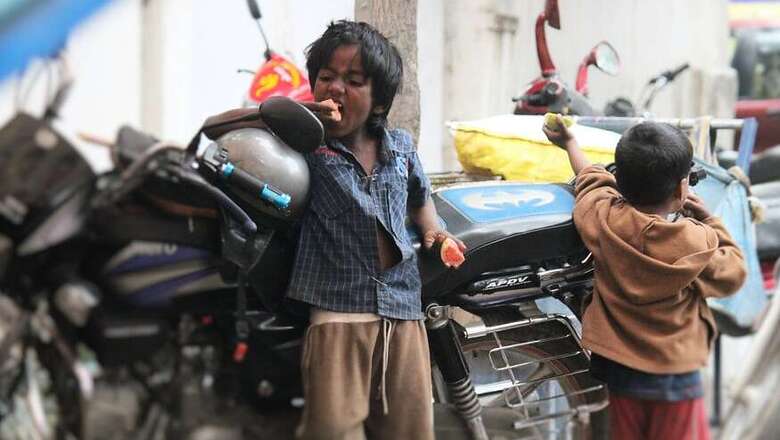
views
We are a nation that carries 23.8% of the global burden of malnutrition, with a total of 195.9 million under-nourished people. But it is reassuring that the government is committed to tackle malnutrition on a war footing with the highest political will, from the Prime Minister himself.
In the recently concluded Parliament session, Minister for Women and Child Development Smriti Irani emphasised that several ministries and the Niti Aayog are working in tandem to reduce malnutrition in India under the Poshan Abhiyaan. The mission is ambitious and result-oriented, with an objective to achieve reduction in stunting by 25% by 2025 -- this would mean a 2% reduction per annum.
In an attempt to plug holes in the existing delivery of Anganwadi services, the focus is on real-time monitoring, behavioural change, ‘jan andolan’ (or people’s movements) and incentives to frontline workers, making it an impressive programme on paper. The successful delivery of a technical programme like the Poshan Abhiyaan requires good governance at all levels, from the Centre to the panchayats. An aspect of good governance is citizen engagement, which supports public officials in the quality and accessibility of services. Unfortunately, the nutrition mission makes a weak attempt at this, by using two powerful words “Jan Andolan” or “people’s movement.”
In citizen engagement, the citizen is not homogenous and engagement can happen anywhere across the delivery spectrum, from policy making to interaction with frontline workers. Who would qualify as a “citizen” or the “jan” in the delivery of the Poshan Abhiyaan? The question needs to be answered with sincerity, so the citizen is at the centre of the engagement design, such that it results in accountability.
The definition of who is a citizen will differ from the national, state, district, block and village level. For now, let us assume that the citizen is a beneficiary of a government scheme at the village level. She is a pregnant tribal woman, residing in a hamlet somewhere in the country. Successful engagement for her would mean an improved interface with the service provider – empowered enough to critique the services of the Anganwadi centre and demand better quality services. Mechanisms to drive this kind of engagement could include citizen satisfaction surveys, public consultations, participatory budget and social audits. Currently, the Poshan Abhiyaan does not include any such methods or tools.
In setting up processes of citizen engagement for accountability, the Poshan Abhiyaan could learn from the Mahatma Gandhi National Rural Employment Guarantee Act (MGNREGA), a rights-based legislation. MGNREGA provides for social audits by the gram sabha under Section 17. As someone who has been involved with social accountability in MGNREGA, I can confirm that understanding people’s narratives and experiences can enrich learning for the government to further improve the efficiency of scheme delivery so it benefits the ones in need. It helps public officials monitor the scheme, the process of implementation, audit the quality of decision making and most importantly, promote equity and good governance.
Another approach to improving citizen engagement could be through community platforms like Self-Help Groups (SHGs) and gram sabhas. The Poshan Abhiyaan intends to do this, but lacks how these platforms reinforce accountability.
In this regard, the government of Odisha has taken a progressive step and initiated the PEETHA programme from January. PEETHA stands for People’s Empowerment - Enabling Transparency and Accountability of Odisha Initiatives. It aims at creating awareness about various government schemes and improving transparency in distribution of social benefits to individuals. This unique platform organises camps at the gram panchayat level where people can learn about services and demand them as well as seek redressal for their grievances. This works especially well for women who reside in tribal hamlets and covers all relevant schemes that include health, nutrition, pension and livelihoods.
While PEETHA can be further strengthened with the availability of better data, the Poshan Abhiyaan can draw lessons from here.
The Poshan Abhiyaan was launched in 2017, with a real opportunity to use tools of citizen engagement to improve accountability in the Integrated Child Development Services (ICDS) and improve last-mile delivery. Jan Andolan under the Abhiyaan has improved event-based participation of citizens limited to awareness on various technical themes like breastfeeding, complementary feeding, and anaemia. But experience on schemes like MGNREGA and platforms like PEETHA suggest the need to move beyond these. Towards beneficiaries’ engagement at the Anganwadi centre-level through methods of social accountability with these prerequisites – ‘Sahi Jankari’ (giving people the right information), ‘Sahi Bhagidari’ (participation by the right people) and ‘Janta Ka Manch’ (the right platform for common people).
At the moment, nutrition has high political priority, this needs to be complemented with a people’s movement from the ground that demands accountability from the system and improves the governance for better service delivery. The recent initiative Mo-Chatua led by the Women and Child Development (WCD) department launching the mobile app and the website is a step in the right direction. WCD minister Tukuni Sahu said that management information system and application will work as an interactive as well as an end-to-end platform for real-time monitoring of indenting, issue of work orders, production and supply of take home ration (THR) till the settlement of payment to the THR producing self-help groups. This is an initiative which will lead to effective nutrition governance.
(The author is the former director of social audit for the Assam government. She also audited the Odisha programme. Views are personal.)




















Comments
0 comment